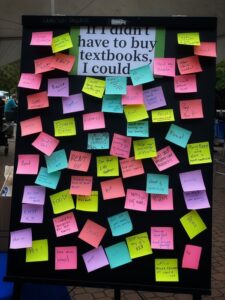Seeing students lining up at the bookstore to purchase expensive textbooks for the semester is a familiar scene, but could it become a thing of the past? Emily Schudel, chair and instructional designer at The Dr. Lloyd Morin Centre for Excellence and Learning at Camosun College, is working toward a future consisting of free course material for students.
Schudel’s involvement began roughly five years ago when Sybil Harrison, now retired director of learning services at Camosun, asked her to be the project manager for an open textbook sustainability project. Schudel is now working on communicating the benefits of free course materials for students.

“I worked with seven faculty members to develop free and open course materials to support their students,” says Schudel. “Some of them actually designed open textbooks so their students wouldn’t have to pay for textbooks for their courses anymore. So, that’s kind of how I got involved. From there, I discovered that other people were doing this great work, but a lot of people didn’t know about it. So now I’m trying to spread the word as much as possible.”
To bring awareness to the issue, Schudel had a booth set up at this September’s CamFest asking students for their input (see photo).
“I had a big kind of bulletin board where people could put sticky notes letting us know what they could do if they didn’t have to buy textbooks,” she says. “Students were telling me that they’re having a hard time: they are paying a lot of rent, it’s very expensive to live in Victoria, food prices have gone up. And if they didn’t have to buy textbooks as well, they could afford to buy food, to pay rent, to send money home to their families. There were a lot of really heartbreaking stories that I heard from students.”
Upon reflecting on the sticky notes, Schudel hopes that the financial barriers being placed on students will be taken into consideration for future decisions.
“It’s an image that I wish administration would take a closer look at, because there were a lot of notes up there about rent and food,” she says. “And taking away a paid textbook seems like a very small step towards supporting people being able to get an education. In my small world, I really believe that education should be free across the board. But if we can’t make it completely free, then I think we should be working harder as an institution to support faculty to create what are called zero-textbook-cost courses for students.”
Schudel believes that Camosun has done a good job of implementing free course materials for students so far, but acknowledges that there’s more work to be done.
“Camosun is already doing a pretty good job,” says Schudel. “There’s a lot of courses that are already using open textbooks and a lot of people who are finding ways of integrating zero-textbook-cost materials into their teaching. So, we’re already doing a lot of good things, but we can do better, and we need to do better.”
Schudel wants to encourage students to advocate for free course materials by talking to teachers, chairs, and program leaders, as well as writing letters to Camosun president Lane Trotter, asking for change. She’s hopeful that expensive textbooks at the college will become a thing of the past.
“I think that there’s no doubt in my mind that this is going to become a priority at the college,” she says. “We’ll probably see bigger pockets within programs of going to a program level, zero textbook cost. I’ve already talked to a couple of program areas that are looking at eliminating all costly materials, course materials, for their programs, for their students. So, we are going to see growth, and we just need to keep that momentum going.”
